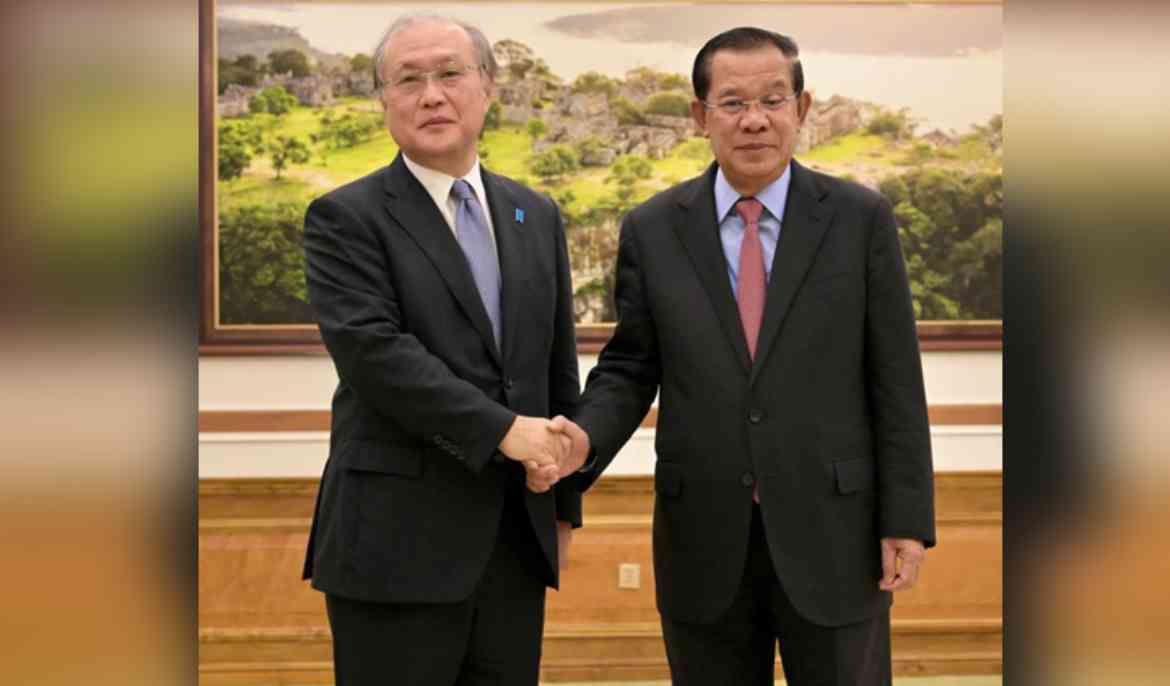Cambodian Senate President Hun Sen announced that Japanese ships would be the first to dock at Ream Port upon its completion.
On Friday (Dec. 20), Hun Sen received a courtesy call from Akiba Takeo, the National Security Advisor of Japan, at the Senate.
On the occasion, Akiba Takeo expressed his deep respect and gratitude to Hun Sen for sparing time in his busy schedule to meet the Japanese delegation. He praised Hun Sen’s pivotal role in leading Cambodia towards peace, stability, and prosperity after enduring a painful and tragic history.
Akiba Takeo also highlighted the strong and growing relations between Cambodia and Japan in all sectors, including security, under Hun Sen’s leadership. He shared updates on Japan’s ongoing review of its national security strategy, which aims to adapt to the evolving regional situation. The strategy emphasises strengthening constructive dialogue with partner countries and major powers, including China. He added that dialogue and cooperation, particularly with China, are essential for achieving stability, prosperity, and development.
Furthermore, Akiba Takeo reaffirmed Japan’s commitment to enhancing cooperation with Cambodia, ASEAN, and other major powers to ensure stability and development in the region.
For his part, Hun Sen warmly welcomed Akiba Takeo and the Japanese delegation during their visit to Cambodia. He expressed hope that their visit and discussions would further strengthen relations and cooperation between Cambodia and Japan, fostering greater mutual understanding.
He acknowledged the progress in defense sector collaboration, both naval and land-based, as a reflection of the comprehensive strategic partnership between the two countries. He announced that Cambodia would permit Japanese ships to dock first at Ream Port once its construction is complete, symbolising the strong ties between the two nations.
Hun Sen also expressed gratitude for Akiba Takeo’s positive assessment of his leadership, particularly in national unification and peacebuilding—achievements unprecedented in Cambodia’s history. He highly valued the steady progress in Cambodia-Japan relations across various fields, extending appreciation for Japan’s longstanding support for Cambodia’s development. This support includes building infrastructure, such as the development of Sihanoukville Port and logistics systems. He underscored the importance of peace as the cornerstone of Cambodia’s continued development and prosperity.
Regarding Japan’s review of its national security strategy, Hun Sen underscored similarities with Cambodia’s approach, highlighting a shared commitment to strengthening peace. He reiterated that without peace, discussions on human rights, democracy, and development would be impossible. He also expressed gratitude to Japan for deploying the Japan Self-Defence Forces (JSDF) as part of the UN peacekeeping operations in Cambodia in 1992—a mission he supported despite facing criticism from the international community and some regional countries.
Hun Sen praised Japan’s role in the region, highlighting its status as a reliable partner that respects ASEAN’s centrality. He affirmed Cambodia’s support for Japan’s Free and Open Indo-Pacific Strategy, noting its alignment with ASEAN’s principles.
While acknowledging the proliferation of Indo-Pacific strategies and regional initiatives, he reiterated Cambodia’s commitment to supporting such strategies under three key principles: (1) promoting peace, development, and cooperation rather than conflict; (2) avoiding becoming a tool against any specific country; and (3) respecting ASEAN’s centrality. He underlined Cambodia’s independent decision-making in international relations.
Addressing regional tensions, Hun Sen attributed the challenges to distrust among major powers and excessive external interference in regional affairs. He warned that these dynamics fueled an arms race and encouraged more dialogue between Japan and China to build mutual trust.
Both sides also discussed on international issues, including the ongoing conflict between Russia and Ukraine.
He concluded by wishing Akiba Takeo and the Japanese delegation a pleasant stay in Cambodia.Fresh News



